

Schools - Education - Research In Education - Research Projects - CRESL Teacher Assessment in Primary Science (TAPS) Project. The focus for our work with the Primary Science Teaching Trust (PSTT) is the development of an approach to teacher assessment in science to meet the requirements of the revised national curriculum in England, and to define ‘best practice’ across the UK.
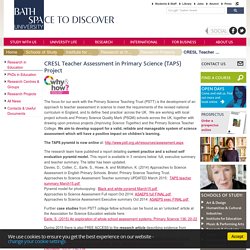
We are working with local project schools and Primary Science Quality Mark (PSQM) schools across the UK, together with drawing upon previous projects (Improving Science Together) and the Primary Science Teacher College. We aim to develop support for a valid, reliable and manageable system of science assessment which will have a positive impact on children’s learning. The TAPS pyramid is now online at: The research team have published a report detailing current practice and a school self evaluation pyramid model. This report is available in 3 versions below: full, executive summary and teacher summary. We are currently working on exemplification and updating of focused assessments. Maths for science. Biologists are increasingly using mathematical tools to aid in research.
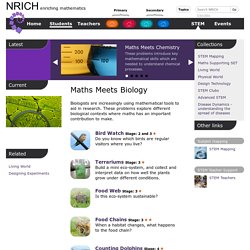
These problems explore different biological contexts where maths has an important contribution to make. Bird Watch Stage: 2 and 3 Challenge Level: Do you know which birds are regular visitors where you live? Terrariums Stage: 3 Challenge Level: Build a mini eco-system, and collect and interpret data on how well the plants grow under different conditions. Food Web. KS3 Science Syllabus. Mapping a route through the exam-conversion maze. I think I’ve probably worked through about five incarnations of Geography A level, and pretty much the same with GCSEs.
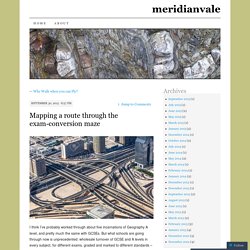
But what schools are going through now is unprecedented: wholesale turnover of GCSE and A levels in every subject, for different exams, graded and marked to different standards – oh, and all at a different pace and order. The presentation I took along to #pedagoohampshire recently was an attempt to consider this collision of currents. If we think ‘workload’ has been an issue of the recent past well, it’s just about to ratchet up three to eight notches for heads of department and subject teams as they are plunged into new courses, new schemes of work, new lesson plans and the production of new resources upon a swell of constraints. Positive about practical. Transform learning You know what happens when practicals become truly experimental.
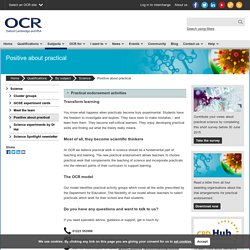
Students have the freedom to investigate and explore. They have room to make mistakes – and learn from them. They become self-critical learners. They enjoy developing practical skills and finding out what the theory really means. Most of all, they become scientific thinkers. Changes to GCSEs, AS and A levels that will affect each current school year group. This document gives an overview of the changes that will happen to GCSEs, AS levels and A levels.
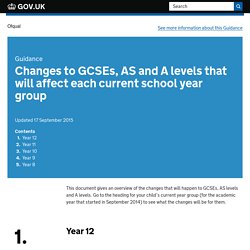
Go to the heading for your child’s current year group (for the academic year that started in September 2014) to see what the changes will be for them. 1. Year 12 1.1 September 2015 Students will start learning new AS levels and A levels in: art and design biology business chemistry computer science economics English language English language and literature English literature history physics psychology sociology 1.2 Summer 2016. Commission on Assessment Without Levels - Groups. Daisy Christodoulou - Life A Levels. A Science Mastery Curriculum. Big Ideas in Science. What Are the Differences Between Controlled & Comparative Experiments? National curriculum in England: science programmes of study. Key Objectives for KS1/2. To support assessment of the new curriculum – and in line with the recommendations from the NAHT Assessment Commission’s recommendations – I have compiled lists of Key Objectives for each of the core subject areas for Years 1 to 6.
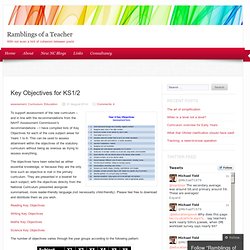
This can be used to assess attainment within the objectives of the statutory curriculum without being as onerous as trying to assess everything. The objectives have been selected as either essential knowledge, or because they are the only time such an objective is met in the primary curriculum. They are presented in a booklet for each subject, with the objectives directly from the National Curriculum presented alongside summarised, more reader-friendly language (not necessarily child-friendly). Please feel free to download and distribute them as you wish. Reading Key Objectives Writing Key Objectives. Accredited reformed qualifications. Accreditation of reformed GCSEs, AS and A levels, for first teaching in 2015 The first reformed GCSE, AS and A levels will be introduced for first teaching in schools and colleges in September 2015.
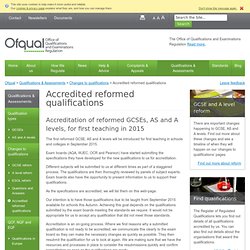
Exam boards (AQA, WJEC, OCR and Pearson) have started submitting the specifications they have developed for the new qualifications to us for accreditation. Different subjects will be submitted to us at different times as part of a staggered process. The qualifications are then thoroughly reviewed by panels of subject experts. Exam boards also have the opportunity to present information to us to support their qualifications. National curriculum: video interviews for schools. Headteachers, members of the expert groups who contributed to the design of the new curriculum and others speak about how they are using the new national curriculum in their schools and about how schools can prepare for the changes.
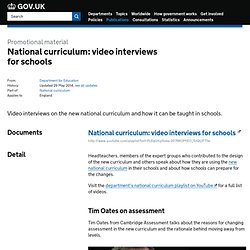
Visit the department’s national curriculum playlist on YouTube for a full list of videos. National curriculum in England: framework for key stages 1 to 4. This is the statutory national curriculum framework, including programmes of study and attainment targets for all subjects at all key stages 1 to 4, except key stage 4 English, mathematics and science, which will follow after a public consultation on their draft programmes of study.
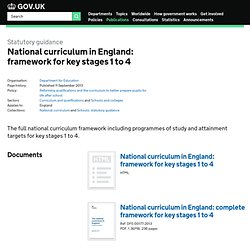
These are to be taught in all maintained primary and secondary schools in England from September 2014. Separate versions containing just the primary (key stages 1 to 2) and secondary (key stages 3 to 4) curriculums are also available. The html version covers chapters 1 to 7 of the national curriculum framework document.
Assessment of practical work in A Level and GCSE sciences – time to try harder? - CA. Assessment of practical work in A Level and GCSE sciences – time to try harder?
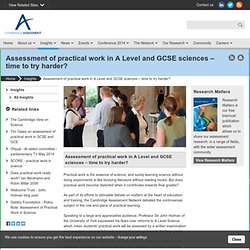
Practical work is the essence of science, and surely learning science without doing experiments is like studying literature without reading books. But does practical work become distorted when it contributes towards final grades? As part of its efforts to stimulate debate on matters at the heart of education and training, the Cambridge Assessment Network debated the controversial subject of the role and place of practical learning. Speaking to a large and appreciative audience, Professor Sir John Holman of the University of York expressed his fears over reforms to A Level Science which mean students' practical work will be assessed by a written examination and awarded a pass or fail mark instead of counting towards the final grade. "I think schools and colleges will conclude [practical science] is irrelevant for university, and history suggests we should be cautious.
Related materials. National Curriculum: Tim Oates on Assessment. Opening the door to deeper understanding The removal of levels in primary education should allow schools to move to a model based on focused assessment of the specifics of the National Curriculum, says Tim Oates, Group Director of Assessment Research and Development at Cambridge Assessment As chair of the expert panel that reviewed the National Curriculum between 2010 and 2013, Mr Oates studied many high performing jurisdictions across the world and found a common theme among them was that primary school age children studied fewer things in greater depth. “They secured deep learning in central concepts and ideas,” he says. “Assessment should focus on whether children have understood these key concepts rather than achieved a particular level.” There is a number of compelling reasons for levels being dropped, he adds in a video for the Department for Education’s YouTube channel.
Primary Curriculum 2014. Creating your school curriculum. The Cambridge Primary Review.